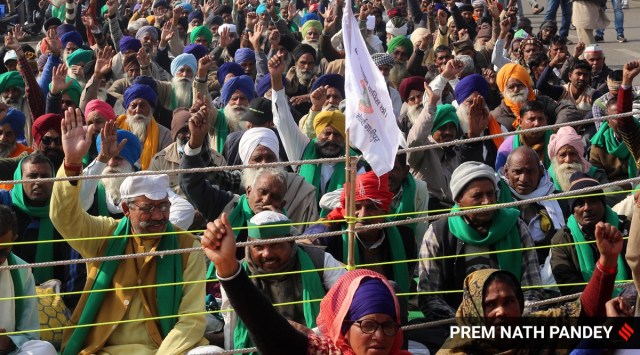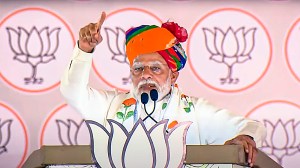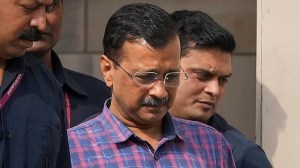- India
- International
Centre details ‘2 decades’ of talks, says no option but reforms post-Covid
The affidavit filed by the Secretary, Ministry of Agriculture and Farmers' Welfare, also underlined the “serious, sincere and constructive efforts" made by the government to engage with "the limited number" of farmers protesting the laws
 Protesters at the Delhi-Ghazipur border. (Express Photo: Prem Nath Pandey/File)
Protesters at the Delhi-Ghazipur border. (Express Photo: Prem Nath Pandey/File)Seeking to dispel what it called “the erroneous notion… peddled” by protesters that the government and Parliament did not hold any consultations before passing the farm laws, the Centre Monday filed an affidavit in the Supreme Court detailing the “two decades of deliberations” behind them. It also argued that some states had been tardy in implementing the reforms in their “true spirit”.
The affidavit filed by the Secretary, Ministry of Agriculture and Farmers’ Welfare, also underlined the “serious, sincere and constructive efforts” made by the government to engage with “the limited number” of farmers protesting the laws. It said that the fact that the agitation was limited to only one place showed that a majority of the farmers find the legislation “progressive and in their interest” by offering them options. “The agitation by/in the name of some of the farmers may, therefore, not be treated as reflection on the validity of the law or its efficacy and usefulness for the farmers’ community.”
The affidavit argued that changes were needed in state marketing laws as these hindered agricultural trade as well as provision of legal support to farmers to realise remunerative prices. It said the need for reforms “was felt and conceived in the late Nineties after kick-start of economic liberalisation”, and that an Expert Committee set up to review the agricultural marketing system had in a June 2001 report suggested various legislative reforms.
Following this, the Centre pointed out, an inter-ministerial task force report of June 2002 had also recommended “several legislative reforms in the State APMC Acts and the Essential Commodities Act to remove restrictive provisions impeding development of an efficient and competitive marketing system, for promotion of direct marketing, for encouraging contract farming and for rationalisation of market fee/tax structure”.
It was after acceptance of this report that the Agriculture Ministry formulated the Model APMC Act, 2003, and Rules, 2007, in consultation with states, the Centre said. When it was noticed that their adoption by states and Union territories “was of varied degree and slow”, in 2010, an Empowered Committee of 10 state ministers was formed to “persuade” the states to implement the Act and rules, as well as to suggest further reforms.

This committee submitted its report in 2013, seeking steps for removing barriers in the way of markets. The affidavit said the committee “specifically consulted farmers from various states”, and hence the petitioners’ claim of not being consulted “has no basis in fact whatsoever”.
The affidavit went on to mention a Working Group of Agriculture Production, constituted in May 2010, under the chairmanship of the Haryana Chief Minister and including CMs of Punjab, West Bengal and Bihar. It said this group recommended “that the market for agricultural produce must be immediately freed of all sorts of restrictions on movement, trading, stocking, finance, exports etc” and that “no monopoly, including that of APMCs or corporate licensees, should be allowed to restrict the market”. The committee also suggested that the Essential Commodities Act be invoked only in times of emergency and in consultation with states.
Next, in 2017, the Centre said, the government formulated “a progressive, more liberal” State Agriculture Produce and Livestock Marketing (Facilitation & Development) Act to “provide for geographically restriction-free” trade of agricultural produce; to give “freedom” to farmers to sell; to “enhance transparency” in payments; to promote multiple channels for competitive marketing, agri-processing and agricultural export; and to encourage investments.
On May 21, 2020, the affidavit said, the Department of Agriculture, Cooperation and Farmers’ Welfare held a meeting, attended by 13 states/UTs, for feedback on this new legal framework.
Thus, the Centre said, it has been “actively and intensively engaging with the states for about two decades to achieve the… objectives of reforms to provide accessible and barrier-free market system” and that “states either showed reluctance to adopt the reforms in true spirit or made partial or cosmetic reforms”.
It said that while the Covid-19 lockdown setbacks had further accentuated the need for reforms, only states such as Tamil Nadu, Uttar Pradesh, Karnataka, Uttarakhand, Madhya Pradesh, Goa, Tripura and Meghalaya had taken some measures to facilitate farmers. And that it was in light of this that it had brought in the three laws via ordinances, which were later replaced by Acts.
About talks with the protesting farmers, the Centre said it had done all it could to address “specific grievances of some farmers”, listing the “constructive dialogue” held on different dates, and the implementation of the Swaminathan report through hiked MSP. Given that the Acts had received “wide acceptance “, it said, the demand for repeal is “neither justifiable nor acceptable”.
Must Read
Apr 23: Latest News
- 01
- 02
- 03
- 04
- 05







































